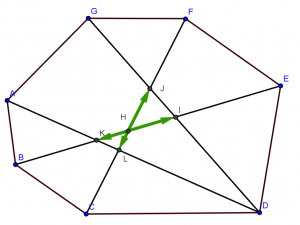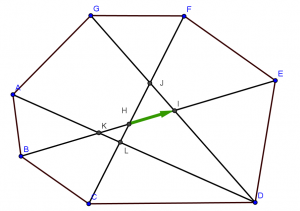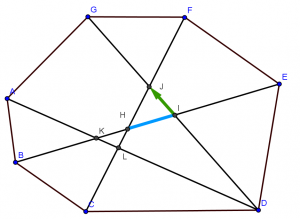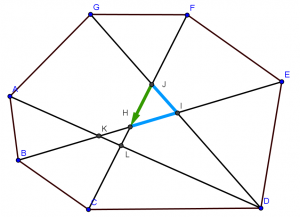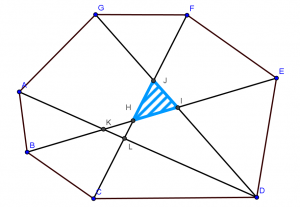1
2
3
4
5
6
7
8
9
10
11
12
13
14
15
16
17
18
19
20
21
22
23
24
25
26
27
28
29
30
31
32
33
34
35
36
37
38
39
40
41
42
43
44
45
46
47
48
49
50
51
52
53
54
55
56
57
58
59
60
61
62
63
64
65
66
67
68
69
70
71
72
73
74
75
76
77
78
79
80
81
82
83
84
85
86
87
88
89
90
91
92
93
94
95
96
97
98
99
100
101
102
103
104
105
106
107
108
109
110
111
112
113
114
115
116
117
118
119
120
121
122
123
124
125
126
127
128
129
130
131
132
133
134
135
136
137
138
139
140
141
142
143
144
145
146
147
148
149
150
151
152
153
154
155
156
157
158
159
160
161
162
163
164
165
166
167
168
169
170
171
172
173
174
175
176
177
178
179
180
| #include <cmath>
#include <cstdio>
#include <vector>
#include <cstring>
#include <algorithm>
using std::vector;
inline int sign(const double x)
{
static const double EPS = 1e-8;
if (x > EPS) return 1;
return x < -EPS ? -1 : 0;
}
const double PI = std::acos(-1.0);
const int MAXN = 200;
const int HASHMOD = 65497;
const int SEED = 57123577;
int Testcase, n, cnt, hashid[65536], hashpos[MAXN*MAXN];
struct Point
{
double x, y;
Point() { }
Point(const double a, const double b): x(a), y(b) { }
};
const Point EMPTY(-10086, -12580);
Point O, hash[65536];
inline bool operator!=(const Point& lhs, const Point& rhs) { return sign(lhs.x-rhs.x) || sign(lhs.y-rhs.y); }
inline Point operator-(const Point& lhs, const Point& rhs) { return Point(lhs.x-rhs.x, lhs.y-rhs.y); }
inline bool operator<(const Point& lhs, const Point& rhs) { return sign(lhs.x-rhs.x) < 0 || (sign(lhs.x-rhs.x) == 0 && sign(lhs.y-rhs.y) < 0); }
inline double cross(const Point& A, const Point& B, const Point& C, const Point& D)
{
const double x1 = B.x-A.x, y1 = B.y-A.y;
const double x2 = D.x-C.x, y2 = D.y-C.y;
return x1*y2 - x2*y1;
}
int intersection(const Point& p1, const Point& p2, const Point& p3, const Point& p4, Point& p)
{
const double s1 = cross(p1, p3, p1, p4);
const double s2 = cross(p2, p3, p2, p4);
const double s3 = cross(p3, p1, p3, p2);
const double s4 = cross(p4, p1, p4, p2);
if (s1*s2 < 0 && s3*s4 < 0)
{
p.x = (s1*p2.x - s2*p1.x) / (s1 - s2);
p.y = (s1*p2.y - s2*p1.y) / (s1 - s2);
return 5;
}
return 0;
}
inline bool cmp(const Point& lhs, const Point& rhs) { return std::atan2(lhs.y, lhs.x) < std::atan2(rhs.y, rhs.x); }
inline int locate(const Point& p)
{
const long long x = static_cast<long long>(p.x * 1e8);
const long long y = static_cast<long long>(p.y * 1e8);
int h = ((x * SEED + y) % HASHMOD + HASHMOD) % HASHMOD;
while (hash[h] != EMPTY && hash[h] != p) ++h;
return h;
}
inline int getid(const Point& p)
{
const int h = locate(p);
if (hashid[h] != -1) return hashid[h];
hash[h] = p, hashpos[cnt] = h;
return hashid[h] = cnt++;
}
struct Segment
{
bool arc, vis;
int target;
//Segment() { }
Segment(const int v, const bool isarc): arc(isarc), vis(false), target(v) { }
};
vector<Segment> v[MAXN*MAXN];
void addedge(const Point& x, const Point& y, const bool isarc)
{
const int a = getid(x), b = getid(y);
v[a].push_back(Segment(b, isarc));
if (!isarc) v[b].push_back(Segment(a, isarc));
}
inline double arcarea(const Point& a, const Point& b)
{
double angle = - std::atan2(a.y, a.x) + std::atan2(b.y, b.x);
if (sign(angle) < 0) angle += 2.0*PI;
return 50.0 * (angle - std::sin(angle));
}
inline bool cmp2(const Segment& lhs, const Segment& rhs)
{
if (lhs.target == rhs.target) return (lhs.arc ? 1 : 0) > (rhs.arc ? 1 : 0);
return cmp(hash[hashpos[lhs.target]]-O, hash[hashpos[rhs.target]]-O);
}
double go(int st, vector<Segment>::iterator edge)
{
const int first = st;
vector<int> p;
double res = .0;
do
{
const int target = edge->target;
if (edge->arc)
res += arcarea(hash[hashpos[st]], hash[hashpos[target]]);
edge->vis = true;
p.push_back(st);
for (vector<Segment>::iterator e = v[target].begin(); e != v[target].end(); ++e)
if (edge->arc == e->arc && (edge->arc || e->target == st))
{
edge = e == v[target].begin() ? v[target].end() : e;
--edge;
break;
}
st = target;
}
while (st != first);
p.push_back(first);
for (vector<int>::size_type i = 1; i < p.size(); ++i)
res += cross(O, hash[hashpos[p[i-1]]], O, hash[hashpos[p[i]]]) / 2.0;
return res;
}
double solve()
{
static Point p[MAXN*MAXN], cut[MAXN][2], tmp;
memset(hashid, 0xFF, sizeof(hashid));
memset(hashpos, 0xFF, sizeof(hashpos));
std::fill(hash, hash+65536, EMPTY);
cnt = 0;
for (int i = 0; i < n; ++i)
{
double a, b;
scanf("%lf%lf", &a, &b);
cut[i][0].x = 10.0 * std::cos(a), cut[i][0].y = 10.0 * std::sin(a);
cut[i][1].x = 10.0 * std::cos(b), cut[i][1].y = 10.0 * std::sin(b);
p[2*i] = cut[i][0], p[2*i+1] = cut[i][1];
}
std::sort(p, p+2*n, cmp);
for (int i = 0; i < 2*n; ++i)
addedge(p[i], p[(i+1)%(2*n)], true);
for (int i = 0; i < n; ++i)
{
int tot = 0;
p[tot++] = cut[i][0], p[tot++] = cut[i][1];
for (int j = 0; j < n; ++j)
if (i != j && intersection(cut[i][0], cut[i][1], cut[j][0], cut[j][1], tmp))
p[tot++] = tmp;
std::sort(p, p+tot);
for (int i = 1; i < tot; ++i)
addedge(p[i-1], p[i], false);
}
for (int i = 0; i < cnt; ++i)
{
O = hash[hashpos[i]];
std::sort(v[i].begin(), v[i].end(), cmp2);
}
double ans = .0;
for (int i = 0; i < cnt; ++i)
for (vector<Segment>::iterator e = v[i].begin(); e != v[i].end(); ++e)
if (!e->vis)
{
const double s = go(i, e);
ans = std::max(ans, s);
}
for (int i = 0; i < cnt; ++i)
v[i].clear();
return ans;
}
int main()
{
for (scanf("%d", &Testcase); Testcase--; )
{
scanf("%d", &n);
printf("%.2f\n", solve());
}
}
|

